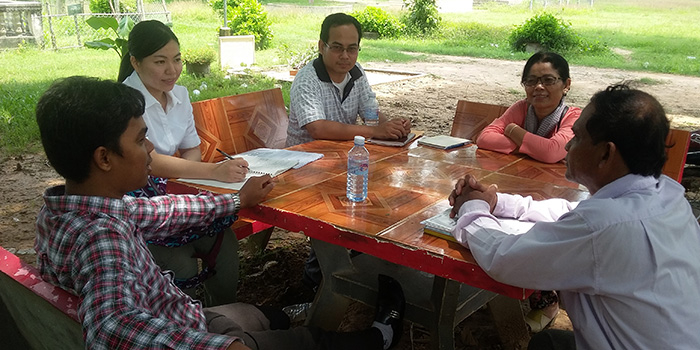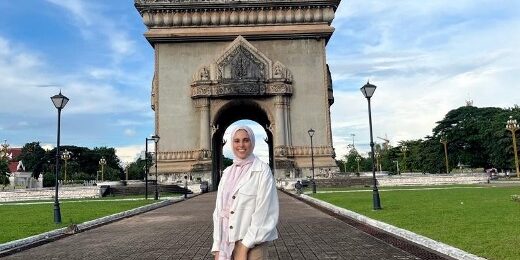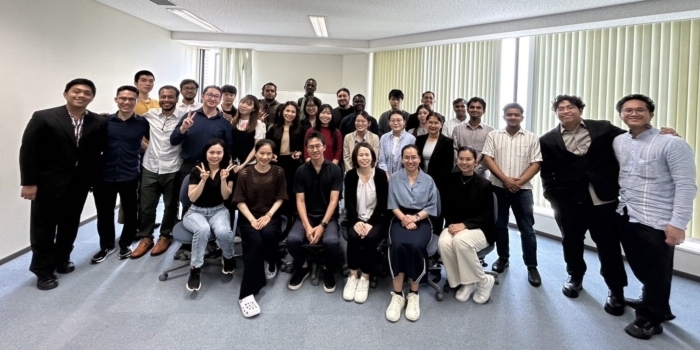From 7th to 25th September 2015, I conducted internship at the Ministry of Education, Youth and Sports (MOEYS) in Cambodia. During the internship, I was attached to the department of education planning and my objectives were to collect data that can help me successfully complete my academic research and to gain work environment/ office experience in the context of a national organization like MOEYS, The four main achievements I registered are : acquisition of the existing data and report regarding non-formal education (NFE) at MOEYS, visit to the UNESCO office of Phnom Penh, interview toward the provincial officer and district officer, and visit to the non-formal education program.
In order to obtain general information about education policy on non-formal education, I went to MOEYS department of non-formal education, where I got relevant documents, reports, and pamphlets about non-formal education. After accessing the documents, I interviewed MOEYS officers working in the department of non-formal education. The interviews helped me get a deeper understanding about the policy on non-formal education in Cambodia. In addition, I visited UNESCO office in Phnom Penh for a meeting with one of the officers to discuss NFE, since UNESCO has long been involved in non-formal education development in Cambodia. During the meeting we exchanged ideas which enabled me to gain a clearer perspective about non-formal education, outside of MOEYS. Likewise, I received valuable advice on how to successfully conduct research on non-formal education in Cambodia.
Furthermore, I visited Takeo and Prey Veng provinces in order to interview the provincial officer and district officer of Education, Youth, and Sports. One provincial officer from each province and one district officer from Takeo province accepted to be interviewed. I asked questions about the process that each office takes for researching, implementing, and evaluating non-formal education program. Through this interview, I was able to have a better understanding of the different roles that the provincial and district offices play to promote non-formal education in Cambodia.
 Moreover, I visited two types of non-formal education programs in Takeo and Prey Veng provinces namely; re-entry program and functional-literacy program. I interviewed teachers and students in the two provinces, under these programs. While in Takeo Province, I visited one re-entry program and one functional-literacy program and interviewed a total of three teachers and one student, in Prey Veng province, I visited two re-entry program and one functional-literacy program and interviewed a total of three teachers and two students. During the interview, I asked about the training program, the lectures, and the relationship between the government and the teachers under the two programs. For the students, I asked about the process of participating in the programs and the goals/ objectives for participating. Also, I observed one re-entry program and one functional literacy program in the Prey Veng province in order to see the interaction of teachers and the students and the content of the lecture. Through this interview and observation, I was able to grasp the concept of non-formal education from the perspective of a classroom.
Moreover, I visited two types of non-formal education programs in Takeo and Prey Veng provinces namely; re-entry program and functional-literacy program. I interviewed teachers and students in the two provinces, under these programs. While in Takeo Province, I visited one re-entry program and one functional-literacy program and interviewed a total of three teachers and one student, in Prey Veng province, I visited two re-entry program and one functional-literacy program and interviewed a total of three teachers and two students. During the interview, I asked about the training program, the lectures, and the relationship between the government and the teachers under the two programs. For the students, I asked about the process of participating in the programs and the goals/ objectives for participating. Also, I observed one re-entry program and one functional literacy program in the Prey Veng province in order to see the interaction of teachers and the students and the content of the lecture. Through this interview and observation, I was able to grasp the concept of non-formal education from the perspective of a classroom.
Throughout the internship, I studied about education policy on non-formal education and experienced a daily work ethics in MOEYS. I obtained data relevant and helpful to me during the process of writing my master’s thesis. In conclusion, I would like to show my appreciation toward His Excellency Mr. Sothea Lim who supervised my internship in the MOEYS, all the officers in the department of planning who gave me support during my internship, and to Prof. Keiichi Ogawa who gave this opportunity and supported me throughout the internship.
Authored by Nozomi SHIRAISHI
Master’s Student
Related






